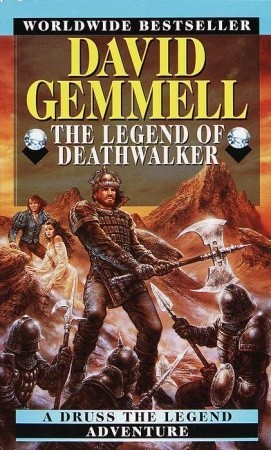 I’m not even going to try to write a synopsis of this story. It’s just like all the other books in the Drenai series, which is why I love it so much. Basically, this one gives the story behind the rise of Ulric, khan of the Nadir, and the origin of the Nadir people. Interestingly enough, Druss the Legend plays a major role.
I’m not even going to try to write a synopsis of this story. It’s just like all the other books in the Drenai series, which is why I love it so much. Basically, this one gives the story behind the rise of Ulric, khan of the Nadir, and the origin of the Nadir people. Interestingly enough, Druss the Legend plays a major role.
This was the last book in the Drenai Saga that I hadn’t read, so reading it was a very bittersweet experience. On the one hand, this one is just as good as all the other books in the series, and made me want to revisit Legend and some of the others. On the other hand, I knew that once I’d finished it, there wouldn’t be any more Drenai books left. So I took it slow for the first half, but naturally I finished it at a breathless late-night sprint a day or two later.
I’ve been thinking a lot lately about why I love David Gemmell’s books so much. There are many reasons, but I think the main reason is that his writing is honest. He strips away all the incidental stuff and gets right at the heart of the stuff that matters. He doesn’t pussyfoot around, either–if his characters do something despicable, he doesn’t make any excuses for them. He tells it like it is. This can make for a very brutal story, but it also makes for a very cathartic one.
The other reason I love his books so much is because he does such a good job depicting raw, unrepressed manhood–not the stupid stuff like driving big cars and eating meat, but manning up and facing your greatest fears. It’s about friendship, and honor, and fighting with all of your strength for something you believe in. It’s about all that raw, pent-up energy we all have, that animal urge that drives us to competitive sports and first person shooters, and channeling it for a heroic cause.
The craziest thing is that the fight itself is actually more important than whatever side the characters are fighting on. In this book, Druss is actually fighting to help bring about the rise of the Nadir khan who later invades his homeland and kills him on the walls of Dros Delnoch. None of that matters, though, because Druss doesn’t fight with malice. For him, it’s all about fighting for something, not against something, and the battle itself is just as important as the victory. I don’t think I can put it better than this:
“Can we win here?” Sieben asked, as the shaman’s image began to fade.
“Winning and losing are entirely dependent on what you are fighting for,” answered Shaoshad. “All men here could die, yet you could still win. Or all men could live and you could lose. Fare you well, poet.”
The best thing about David Gemmell’s books is the fact that none of the characters–not even the bad guys–are defined by their own evil. The Nadir are supposed to be the evil chaotic race of the Drenai universe, but when you come to understand what they’re fighting for, their hopes and dreams for a better future, you can really see what’s good in them. Likewise, the more civilized Gothir are kind of like the evil white men who want to put down the savages and keep them in their place, but there are good and honorable men among them too.
And yet, even though the two sides clash, and good men die on both sides, it somehow isn’t tragic. That’s the crazy part. It’s almost like you can feel the characters salute each other as they die in a good cause, the way Ulric gave Druss a proper funeral in Legend, even though the two were blood-sworn enemies. In David Gemmell’s world, honor and courage are more important than life or money. Everyone dies; dying well is more important than living without honor.
This book is incredible. As I was reading it, I decided it was the best David Gemmell book I’ve ever read–which is something I do every time I read one of his books. I feel like I’m a better man for having read them. If he had written a hundred books in this series, I would happily read them all. The fact that there are no more new ones deeply saddens me, but I know I’ll revisit these stories again in the future.